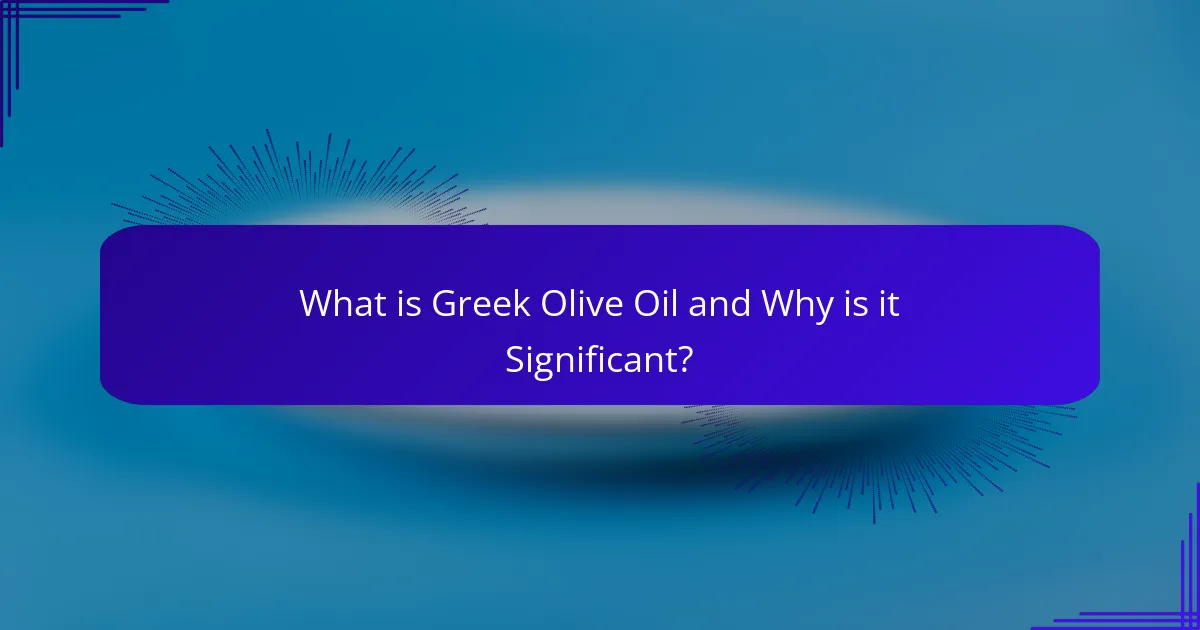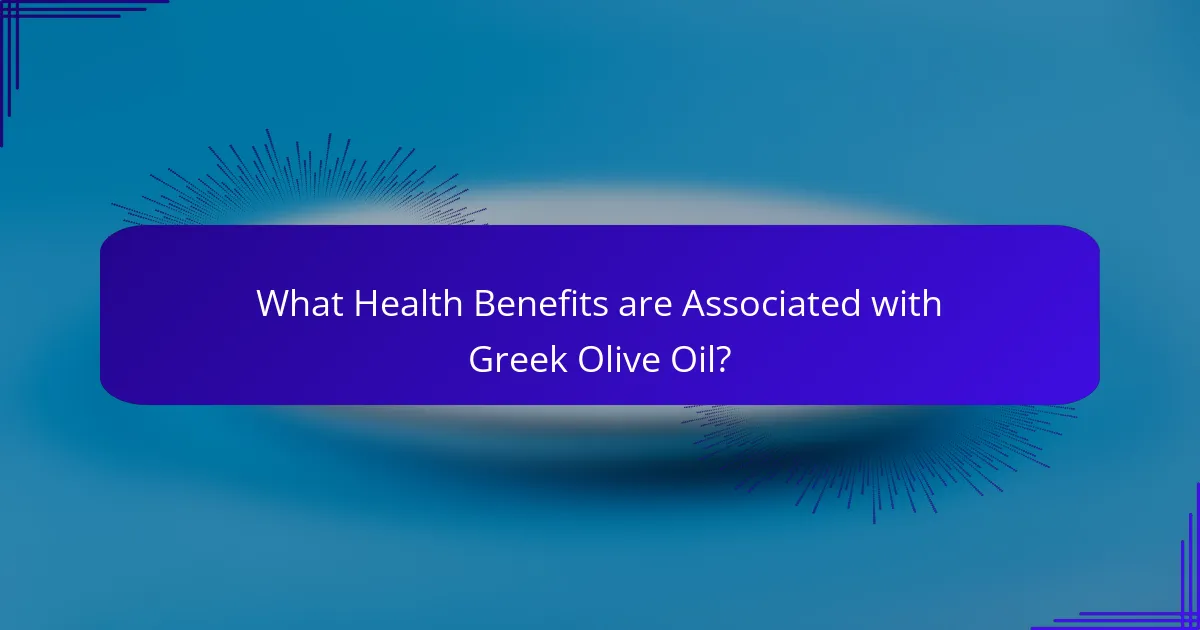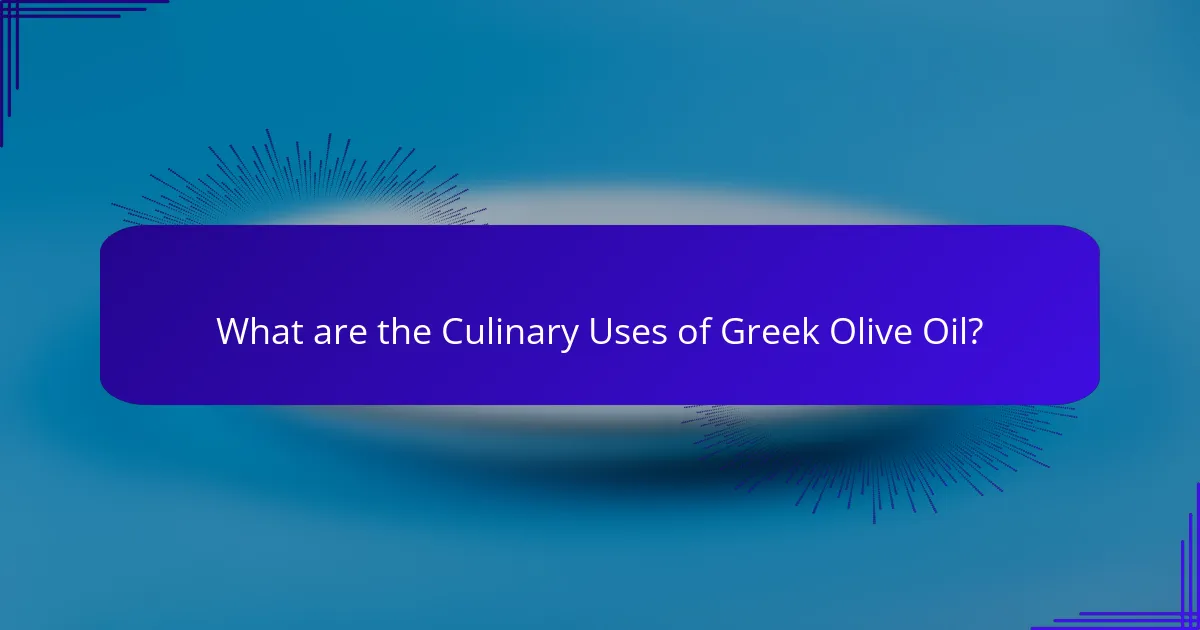
What is Greek Olive Oil and Why is it Significant?
Greek olive oil is a high-quality oil produced from olives grown in Greece. It is significant due to its rich flavor and health benefits. Greek olive oil is often categorized as extra virgin, meaning it is cold-pressed and free from chemical treatments. This oil contains high levels of monounsaturated fats and antioxidants. Research shows that it can reduce the risk of heart disease and inflammation. Additionally, Greek olive oil has been used in traditional Mediterranean diets for centuries. Its cultural importance is reflected in Greek history and cuisine. The production methods, including hand-harvesting and stone milling, contribute to its unique taste and quality.
How is Greek Olive Oil Different from Other Olive Oils?
Greek olive oil is distinct due to its unique production methods and flavor profiles. The country’s climate and soil contribute to the high quality of its olives. Greek olive oil is often produced from native varieties like Koroneiki, which are known for their rich taste and low acidity. Additionally, many Greek producers follow traditional methods, including cold pressing, which preserves flavor and nutrients. Greek olive oils are also regulated by strict quality standards, ensuring authenticity and purity. Studies show that Greek olive oil has higher levels of antioxidants compared to some other varieties. This combination of factors makes Greek olive oil particularly sought after in culinary applications.
What are the unique characteristics of Greek Olive Oil?
Greek olive oil is known for its high quality and distinct flavor. It is primarily produced from native olive varieties such as Koroneiki and Kalamata. These olives contribute to its rich taste profile, characterized by fruity and peppery notes. Greek olive oil has a low acidity level, typically below 0.8%, indicating superior quality. The oil is cold-pressed, preserving its natural antioxidants and nutrients. It is also recognized for its high polyphenol content, which offers health benefits. Studies show that Greek olive oil has anti-inflammatory properties and supports heart health. The unique climate and soil conditions of Greece enhance the oil’s flavor and quality.
Why is the origin of olive oil important for its quality?
The origin of olive oil is crucial for its quality due to the specific environmental conditions and cultivation practices in different regions. Each area imparts unique flavors and characteristics to the oil. For example, Greek olive oil often benefits from the Mediterranean climate, which enhances the fruit’s quality. The soil composition also influences the nutrient content of the olives. Additionally, traditional harvesting methods in Greece contribute to the oil’s freshness and purity. Studies show that oils from specific regions, like Crete, have higher levels of polyphenols, which are beneficial for health. Thus, the origin directly affects both the sensory attributes and health benefits of olive oil.
What are the Traditional Production Methods of Greek Olive Oil?
Traditional production methods of Greek olive oil include hand harvesting, stone milling, and cold pressing. Hand harvesting ensures that olives are picked at their optimal ripeness. This method is labor-intensive but preserves the quality of the fruit. Stone milling involves grinding the olives using traditional millstones. This process retains the natural flavors and nutrients of the olives. Cold pressing is used to extract oil without heat, preserving its quality. These methods have been used for centuries and contribute to the unique taste of Greek olive oil. Historical records indicate that these practices date back to ancient Greece, showcasing their enduring legacy.
How do harvesting techniques affect olive oil quality?
Harvesting techniques significantly affect olive oil quality. The timing of harvest impacts the oil’s acidity and flavor profile. Early harvesting yields oil with higher polyphenol content, enhancing health benefits and shelf life. Conversely, late harvesting can lead to increased acidity and lower antioxidant levels. Mechanical harvesting can cause bruising, leading to oxidation and spoilage. Handpicking, while labor-intensive, minimizes damage and preserves oil integrity. Research shows that oils from hand-harvested olives often score higher in sensory evaluations. Proper harvesting techniques are crucial for maintaining the quality of olive oil throughout its production.
What role does pressing play in the production of olive oil?
Pressing is essential in the production of olive oil. It is the process that extracts oil from crushed olives. This method separates the oil from the solid parts of the fruit. Pressing can be done using traditional stone mills or modern mechanical presses. The quality of the oil is influenced by the pressing technique used. Cold pressing retains more nutrients and flavor. Historical records show that pressing has been used for thousands of years in olive oil production. This method is crucial for producing high-quality extra virgin olive oil.
What Factors Influence the Quality of Greek Olive Oil?
The quality of Greek olive oil is influenced by several key factors. These include the olive variety used, the climate conditions, and the harvesting methods. Different olive varieties produce oils with distinct flavors and characteristics. Climate plays a crucial role in the growth and ripening of olives. Ideal temperatures and rainfall contribute to higher quality oil. Additionally, the timing of harvesting affects oil quality; olives should be picked at the right ripeness for optimal flavor.
The extraction process also significantly impacts quality. Cold pressing methods preserve the oil’s natural flavors and nutrients. Lastly, storage conditions, such as light and temperature, can affect the oil’s shelf life and taste. Studies show that oils stored in dark, cool places maintain their quality longer.
How does climate impact olive oil production?
Climate significantly impacts olive oil production. Olive trees thrive in Mediterranean climates, characterized by hot, dry summers and mild, wet winters. These conditions are essential for optimal growth and fruit development. Excessive rainfall can lead to root diseases and reduced oil quality. Conversely, insufficient rainfall can stress the trees, resulting in lower yields. Temperature fluctuations also affect flowering and fruit set. For instance, temperatures below freezing can damage buds. Studies show that climate change is altering traditional growing regions, impacting harvest times and oil characteristics. For example, warmer temperatures may lead to earlier harvests, affecting flavor profiles.
What are the best practices for olive tree cultivation?
The best practices for olive tree cultivation include selecting the right variety, ensuring proper soil conditions, and implementing effective irrigation techniques. Choosing a variety suited to the local climate is crucial. Olive trees thrive in well-drained, sandy or loamy soils with a pH between 6 and 8. Regular soil testing is recommended to maintain optimal nutrient levels.
Irrigation is vital, especially in dry regions. Drip irrigation systems are often the most efficient method. Pruning should occur annually to promote healthy growth and fruit production. Pest and disease management is essential; integrated pest management strategies can minimize chemical use.
Harvesting should take place at the right time for optimal oil quality. The timing can affect the flavor and yield of the olives. Following these practices can lead to successful olive tree cultivation and high-quality olive oil production.

What Health Benefits are Associated with Greek Olive Oil?
Greek olive oil is known for numerous health benefits. It is rich in monounsaturated fats, which can improve heart health. Studies show that it helps reduce LDL cholesterol levels. Greek olive oil is also high in antioxidants, such as vitamin E and polyphenols. These compounds may reduce inflammation and lower the risk of chronic diseases. Research published in the Journal of Nutritional Biochemistry indicates that olive oil can enhance brain function. Additionally, its anti-inflammatory properties may aid in managing conditions like arthritis. The Mediterranean diet, which includes Greek olive oil, is linked to longevity and reduced disease risk.
How does Greek Olive Oil contribute to heart health?
Greek Olive Oil contributes to heart health primarily through its high content of monounsaturated fats. These fats help reduce bad cholesterol levels. Lowering bad cholesterol decreases the risk of heart disease. Greek Olive Oil is also rich in antioxidants, particularly polyphenols. These compounds have anti-inflammatory properties that support cardiovascular health. Studies indicate that regular consumption of Greek Olive Oil can lower blood pressure. Research published in the “Journal of the American College of Cardiology” shows that a Mediterranean diet rich in olive oil is associated with a lower incidence of heart disease. Overall, Greek Olive Oil’s unique profile of healthy fats and antioxidants makes it beneficial for heart health.
What specific nutrients in Greek Olive Oil promote cardiovascular health?
Greek olive oil contains several specific nutrients that promote cardiovascular health. These include monounsaturated fats, particularly oleic acid. Oleic acid helps reduce bad cholesterol levels while increasing good cholesterol. Greek olive oil is also rich in antioxidants, such as vitamin E and polyphenols. These antioxidants combat oxidative stress and inflammation, which are linked to heart disease. Additionally, the presence of omega-3 and omega-6 fatty acids supports overall heart health. Studies have shown that diets high in olive oil are associated with a lower risk of cardiovascular events. The Mediterranean diet, which emphasizes olive oil, further reinforces these health benefits through its holistic approach to nutrition.
How does olive oil consumption relate to cholesterol levels?
Olive oil consumption can positively affect cholesterol levels. It is rich in monounsaturated fats, which help reduce low-density lipoprotein (LDL) cholesterol. Studies show that incorporating olive oil into a diet can raise high-density lipoprotein (HDL) cholesterol, known as the “good” cholesterol. For instance, a study published in the “American Journal of Clinical Nutrition” found that participants consuming olive oil had improved cholesterol profiles. This improvement is attributed to the antioxidants and healthy fats present in olive oil. Regular consumption of olive oil is linked to a lower risk of cardiovascular diseases due to these cholesterol benefits.
What Antioxidants are Found in Greek Olive Oil?
Greek olive oil contains several key antioxidants. The primary antioxidants found in Greek olive oil include oleuropein, hydroxytyrosol, and tyrosol. Oleuropein is known for its anti-inflammatory and cardiovascular benefits. Hydroxytyrosol is recognized for its strong antioxidant properties and potential to reduce oxidative stress. Tyrosol also contributes to the overall antioxidant capacity of the oil. Studies indicate that these antioxidants play a crucial role in promoting health and preventing diseases. For instance, research published in the Journal of Nutritional Biochemistry highlights the health benefits associated with these compounds.
What are the benefits of oleocanthal in olive oil?
Oleocanthal in olive oil offers anti-inflammatory and antioxidant benefits. This compound has been shown to reduce inflammation similarly to ibuprofen. Research indicates that oleocanthal can inhibit the activity of pro-inflammatory enzymes. Studies demonstrate its potential in reducing the risk of chronic diseases. Oleocanthal may also contribute to cardiovascular health by improving blood circulation. Furthermore, it has neuroprotective properties that may help in preventing neurodegenerative diseases. The presence of oleocanthal is one reason extra virgin olive oil is linked to the Mediterranean diet’s health benefits.
How do antioxidants in olive oil affect overall health?
Antioxidants in olive oil positively affect overall health by reducing oxidative stress in the body. They help neutralize free radicals, which can cause cellular damage. Research indicates that the polyphenols in olive oil contribute to heart health. For example, the Mediterranean diet, rich in olive oil, is linked to lower cardiovascular disease rates. Studies show that these antioxidants may also have anti-inflammatory properties. This can potentially lower the risk of chronic diseases such as diabetes and cancer. Furthermore, antioxidants support brain health by improving cognitive function. Thus, the presence of antioxidants in olive oil is crucial for maintaining overall health.
Why is Greek Olive Oil Considered a Superfood?
Greek olive oil is considered a superfood due to its high levels of monounsaturated fats and antioxidants. It contains oleic acid, which is linked to reduced inflammation and improved heart health. Greek olive oil also boasts a high polyphenol content, contributing to its antioxidant properties. Research indicates that these compounds can lower the risk of chronic diseases. The Mediterranean diet, which prominently features Greek olive oil, is associated with longevity and better overall health. Studies show that regular consumption of olive oil can enhance cognitive function and reduce the risk of Alzheimer’s disease. Additionally, the traditional production methods used in Greece preserve the oil’s quality and health benefits.
What evidence supports the health claims of Greek Olive Oil?
Greek olive oil is supported by numerous studies highlighting its health benefits. Research indicates that it contains high levels of monounsaturated fats, particularly oleic acid. This type of fat is linked to reduced inflammation and improved heart health. A study published in the “New England Journal of Medicine” found that a Mediterranean diet rich in olive oil lowered the risk of cardiovascular disease. Additionally, Greek olive oil is rich in antioxidants, such as polyphenols. These compounds have been shown to combat oxidative stress and may lower the risk of chronic diseases. The health claims are further validated by the traditional use of olive oil in Mediterranean cultures for centuries.
How does it fit into a Mediterranean diet?
Greek olive oil is a key component of the Mediterranean diet. It provides healthy fats, particularly monounsaturated fats. These fats contribute to heart health and lower cholesterol levels. Greek olive oil is also rich in antioxidants, which help reduce inflammation. Studies show that diets high in olive oil are associated with lower rates of chronic diseases. The Mediterranean diet emphasizes whole foods, including fruits, vegetables, and whole grains, where olive oil serves as a primary fat source. This dietary pattern promotes overall health and longevity.

What are the Culinary Uses of Greek Olive Oil?
Greek olive oil is widely used in various culinary applications. It serves as a primary cooking oil due to its high smoke point. Chefs often use it for sautéing and frying vegetables. Greek olive oil enhances the flavor of salads when used as a dressing. It is also a key ingredient in marinades for meats and fish. Additionally, it is used in baking to add moisture and richness. Greek olive oil is often drizzled over finished dishes for added flavor. Its versatility makes it suitable for both traditional and modern recipes. The distinct taste of Greek olive oil can elevate simple dishes to gourmet levels.
How can Greek Olive Oil enhance flavor in dishes?
Greek Olive Oil enhances flavor in dishes through its rich, fruity, and peppery notes. These distinct flavor profiles come from the variety of olives used and the meticulous production methods. The oil’s high polyphenol content contributes to its robust taste, providing a depth that elevates various culinary creations.
When used as a finishing oil, Greek Olive Oil adds a vibrant finish to salads, grilled vegetables, and meats. Its versatility allows it to complement both Mediterranean and global cuisines. Studies show that the oil’s unique flavor compounds can enhance the overall sensory experience of meals.
Furthermore, Greek Olive Oil can balance and harmonize other ingredients, making dishes more complex and enjoyable. Its ability to withstand cooking temperatures also makes it suitable for sautéing and roasting, preserving its flavor integrity.
What types of dishes benefit most from Greek Olive Oil?
Greek olive oil enhances various types of dishes. It is particularly beneficial for salads, where its flavor can shine. Greek olive oil complements grilled vegetables, adding richness. It is ideal for marinades, infusing meats and fish with taste. Pasta dishes benefit from its use, providing a finishing touch. Mediterranean recipes, such as hummus and tzatziki, thrive with Greek olive oil. Additionally, it enhances dips and spreads, contributing to their texture and flavor. The oil’s high quality and low acidity make it suitable for these culinary applications.
How does olive oil pairing work with different cuisines?
Olive oil pairing with different cuisines involves selecting specific types of olive oil to complement various dishes. For Mediterranean cuisine, robust extra virgin olive oils enhance flavors in salads and grilled meats. In Italian cooking, lighter oils may be preferred for sauces and drizzling over pasta. Asian cuisines often benefit from infused olive oils, such as chili or garlic, to add depth to stir-fries.
The flavor profile of olive oil, which can range from fruity to peppery, influences its pairing. For example, a peppery oil pairs well with rich, fatty foods like fish or red meats. Conversely, a mild oil suits delicate dishes, such as seafood or light salads.
The versatility of olive oil is supported by its chemical composition. High levels of monounsaturated fats and antioxidants contribute to its health benefits and culinary adaptability. Olive oil’s ability to enhance the sensory experience of food makes it a staple in diverse culinary traditions.
What are the Best Ways to Store Greek Olive Oil?
Store Greek olive oil in a cool, dark place to maintain its quality. Exposure to light and heat can degrade the oil. Use a dark glass or stainless steel container for storage. These materials protect the oil from light. Ensure the container is tightly sealed to prevent oxidation. Avoid storing olive oil near the stove or in direct sunlight. The optimal storage temperature is between 60°F to 75°F. Proper storage can extend the oil’s shelf life up to two years.
How does storage temperature affect olive oil quality?
Storage temperature significantly affects olive oil quality. High temperatures can lead to the degradation of oil, causing rancidity. Olive oil is sensitive to heat, light, and air exposure. Ideal storage temperatures range between 14°C to 18°C (57°F to 65°F). At temperatures above 24°C (75°F), olive oil can lose its flavor and nutritional properties. Studies indicate that prolonged exposure to heat accelerates oxidation. Oxidation results in the formation of free radicals, which can diminish health benefits. Proper storage in a cool, dark place preserves the oil’s integrity and extends its shelf life.
What containers are best for preserving olive oil freshness?
Dark glass bottles are best for preserving olive oil freshness. They protect the oil from light, which can cause oxidation. Stainless steel containers are also effective, as they prevent exposure to air. Airtight seals are crucial for minimizing oxygen contact. Avoid clear glass and plastic containers, as they allow light and air [censured]. Studies show that exposure to light and air can degrade olive oil quality. Using proper containers extends the oil’s shelf life and maintains its flavor and health benefits.
What Tips Can Help You Choose Quality Greek Olive Oil?
To choose quality Greek olive oil, look for extra virgin grade. Extra virgin olive oil is the highest quality and is made from pure, cold-pressed olives. Check for a harvest date on the label. Fresher oil, ideally within 18 months of harvest, indicates better quality. Examine the packaging; dark glass bottles protect the oil from light exposure. Consider the region of origin; oils from regions like Crete or Kalamata are known for their superior quality. Look for certifications, such as PDO (Protected Designation of Origin), which ensure authenticity. Finally, taste the oil; quality olive oil should have a fruity flavor with a hint of bitterness and pepperiness.
What labels should you look for when selecting olive oil?
Look for labels such as “extra virgin,” “cold-pressed,” and “organic” when selecting olive oil. Extra virgin olive oil indicates the highest quality and lowest acidity. Cold-pressed signifies that the oil was extracted without heat, preserving its flavor and nutrients. Organic labels confirm that the olives were grown without synthetic pesticides or fertilizers. Additionally, look for certifications like PDO (Protected Designation of Origin) or PGI (Protected Geographical Indication). These labels ensure the oil’s origin and production methods meet specific standards. Selecting olive oil with these labels guarantees quality and authenticity.
How can you identify authentic Greek Olive Oil?
Authentic Greek olive oil can be identified by several key characteristics. First, look for the designation “extra virgin” on the label. This indicates the highest quality, with low acidity levels below 0.8%. Second, check for the origin label that specifies “Product of Greece” or “Greek olive oil.” This ensures the oil is sourced from Greek olives.
Third, examine the packaging. Authentic Greek olive oil is often sold in dark glass bottles to protect it from light. Clear bottles may indicate lower quality. Fourth, consider the harvest date. Freshness is crucial; the best oils are consumed within 18 months of harvest.
Fifth, smell and taste the oil. Authentic Greek olive oil should have a fruity aroma and a peppery or slightly bitter taste. These flavors indicate high-quality olives. Lastly, verify certification from recognized organizations, such as the PDO (Protected Designation of Origin) label, which guarantees authenticity.
Greek olive oil is a high-quality oil produced from olives grown in Greece, known for its rich flavor, health benefits, and traditional production methods. This article explores the significance of Greek olive oil, highlighting its unique characteristics, such as low acidity and high antioxidant content, which contribute to heart health and overall wellness. It also examines the impact of harvesting and pressing techniques on oil quality, the role of climate and cultivation practices, and the culinary applications that enhance its flavor in various dishes. Additionally, the article discusses the health benefits associated with Greek olive oil, including its anti-inflammatory properties and its status as a superfood within the Mediterranean diet.
